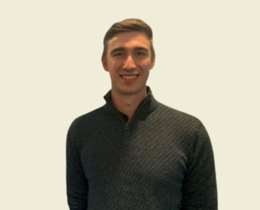If you don’t ask, then you’ll never know
Health & Social Care Research Across North East & North Cumbria.
Philip's Research Story
Philip's Research Story

Philip Hodgson says...
"I was brought up with the philosophy of 'Shy bairns get nowt' – A northern way of saying 'If you don’t ask then you’ll never know'."
On this page
I completed my Physiotherapy training at The University of Birmingham following the completion of my Sport and Exercise Sciences degree. On qualifying, I relocated to Kent and worked clinically across a variety of areas in acute hospitals and community settings. In September 2020, I moved back home to the North East of England to begin a role in re-establishing inpatient physiotherapy services across inpatient mental health settings in Durham and Darlington.
How did you get started in research?
My research journey began with a chance encounter at a local neurorehabilitation conference shortly after beginning my first clinical role. I was then able to act as a trial assistant for projects within my NHS Trust, at which point I begin an NIHR/HEE Internship. The internship gave me a further introduction to clinical research, and I begin to develop my own research project. Following the internship, I was successful in applying for the first cohort of NIHR/HEE funded Pre-Doctoral Clinical Academic Fellowship and I completed a Master’s degree in Clinical Research at The University of Manchester. Like everyone else at that point my plans were disrupted by Covid-19, and as things returned to normal, my wife was offered her dream job and we moved from Canterbury to Durham. On beginning my new role in the North East, I was keen to make links with the Trust Research team. Shortly after starting the role, I was informed about a collaboration between my NHS Trust and York St John University to support PhD students. I applied and was successful starting the PhD part-time in February 2021. I have since been fortunate enough to secure further funding to begin work on other research projects alongside my clinical post.
What inspired you?
I have always been drawn to ask “Why?”. This was not with the intention of frustrating others (however this has happened on occasion!), but from the standpoint of wanting to gain a greater understanding of a particular topic area. This desire to improve my knowledge undoubtedly helped my studies at school, and when beginning at University. However, as I progressed through my physiotherapy degree I was regularly answered with “We don’t know yet”. Credit must go to the University staff for keeping the degree programme up to date and teaching based on the most up to date evidence available which often poses many further questions. Rather than putting me off, this gave me a desire to be part of the teams addressing the ‘yet’, and providing answers to others like myself asking “Why?”.
What do you enjoy about research?
Very simply - I really enjoy learning and research gives the opportunity to do this every day.
What training and support have you found most valuable in your career?
I was brought up with the philosophy of “Shy bairns get nowt” – A northern way of saying “If you don’t ask then you’ll never know” which as a naturally very shy person, this didn’t come easily to me. I was encouraged to contact researchers and clinicians who were experts in my area of interest. This has given me the opportunity to learn directly from leaders in the field.
When contacting individuals with requests to learn from their experience, I have found the vast majority to be both welcoming and supportive. In general, people are happy to share their experience with a view to help others and ultimately provide improved care to the patients. Through making such contacts, I have been able to progress from completing a funded research internship, to a master’s degree, and am now in the process of completing my PhD. Alongside my PhD I am also involved with various other projects centred predominantly around the links between physical and mental wellbeing, which is something I hope to progress further.
One positive to come from the Covid-19 pandemic is that we are no longer constrained by geography when reaching out to others. As long as you are prepared to accommodate virtual meetings at unusual hours on occasion then there is no reason not to meet with people anywhere in the world… The worst thing you can be told is no, or requested to postpone a meeting slightly. Shy bairns get nowt, sometimes you just need to remember that we are all working towards the same thing: Improving patient outcomes.
What people/organisations did you get in touch with to help you?
- Trust research teams
- Previous University staff
- People who have done research I found interesting
Philip Hodgson's top 3 tips
Offer to help others on existing projects
Keep track of published research and where possible (and safe!) implement it clinically
Was this page useful?
Add your feedback
There was an error submitting your feedback, please try again.
Thanks for your feedback, this will help our team improve your experience on the website




